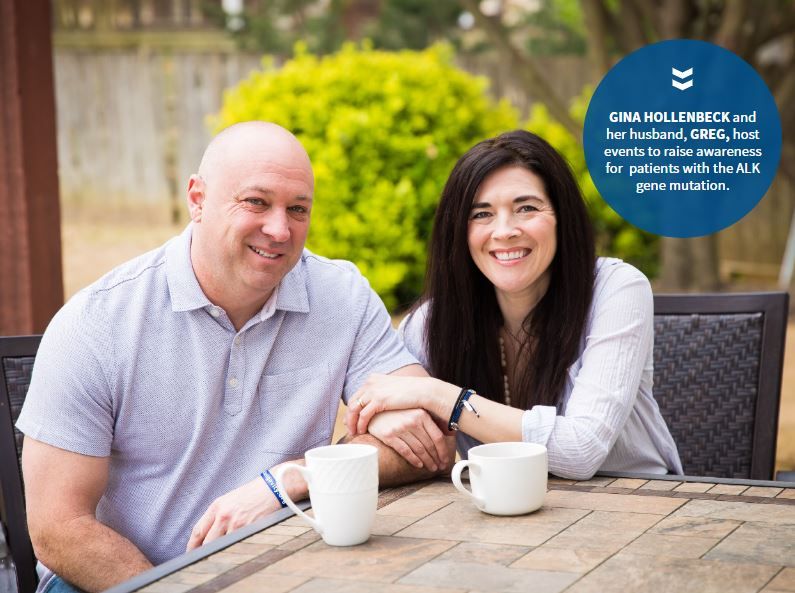‘Tremendous Hope’ Surrounds Emerging Therapies for Cancer That has Spread to the Brain
Better therapies are on the horizon for cancer that has spread to the brain, including a clinical trial that matches patients with treatments based on unique genetic changes in brain metastases.
What had seemed like an innocent but persistent cough prompted Boston resident Lisa M.* to call her doctor in December 2014. “I thought I might have the flu and was hoping for something to make me feel better,” she says. Instead, Lisa, who had received a diagnosis of melanoma two years earlier at age 50, was sent for chest X-rays.
“When the technician asked me to raise my arm above my head, I couldn’t do it. I didn’t understand the directions,” she recalls. This wasn’t the first time Lisa was confused — she had been experiencing unusual symptoms for a while. “I kept hitting the same curb with my car,” she says. “Egg yolks ended up on the countertop because I’d somehow miss the bowl.”
But it wasn’t until the X-ray incident that Lisa realized something could be seriously wrong.
The X-rays revealed spots on her lungs — a sign that the cancer had probably spread or metastasized. Follow-up MRIs and CT scans also found a golf ball-sized tumor and multiple smaller tumors in her brain.
Lisa had brain metastases.
READ MORE: Immunotherapy Combo May ‘Potentially Cure’ Melanoma with Brain Metastases
New Treatments to Address a Growing Problem
Brain metastases are 10 times more common than primary brain cancer. Certain types of cancers — melanoma, breast, lung, kidney, colorectal and blood cancers like leukemia and lymphoma — are most likely to spread to the brain.
According to the American Association of Neurological Surgeons, approximately 200,000 Americans will learn they have brain metastases this year, and experts say that number is on the rise. “With treatment advancements, people with all types of cancers are living longer. The additional years give cancer a chance to come back and spread, and the brain is a common site for metastases,” explains Dr. Chetan Bettegowda, Jennison and Novak Families Professor of Neurosurgery at Johns Hopkins Medicine in Baltimore.
Improvements in diagnostic screenings also are a factor.
“With high-resolution MRIs, we can now find smaller tumors in the brain that older imaging scans missed,” he says. “We’re finding brain metastases before symptoms occur.”
Lisa had a craniotomy surgical procedure to remove the largest brain tumor. Pathology tests on the tumor confirmed that the melanoma had spread. As recently as 15 years ago, brain tumor treatment options were limited to surgery, radiation therapy (either whole-brain or stereotactic radiosurgery) or a combination of the two. Although treatments like chemotherapy have proved highly successful at treating cancers that affect the liver, lungs, breasts and blood, they’re less effective against brain tumors.
“The blood-brain barrier, which protects our brain from toxins, can also limit the amount of drug that gets into the brain,” explains Dr. Priscilla Brastianos, director of the Central Nervous System Metastasis Program at Mass General Cancer Center in Boston. “But researchers have been working to develop drugs that can cross this brain barrier and target brain tumors.”
Because Lisa had a lot of smaller tumors scattered throughout her brain, her doctor recommended forgoing whole-brain radiation therapy (which can cause irreversible memory loss and other problems) for a relatively new brain tumor treatment: immunotherapy.
“Cancer cells can fool your immune system, making it impossible for your system to go after the diseased cells,” says Dr. Michael Vogelbaum, chief of neurosurgery and program leader of the Department of Neuro-oncology at Moffitt Cancer Center in Tampa, Florida. “Immunotherapy reactivates the immune system and engages its intended function to eradicate cancerous cells.”
The most promising immunotherapy drugs for brain tumors are immune checkpoint inhibitors. But the drugs work best when given before the onset of brain metastases symptoms, which include headaches, vision and speech problems, nausea and vomiting, and seizures. As many as 8 in 10 patients see initial improvements with immunotherapy drugs, says Vogelbaum. Unfortunately, that success is often short-lived.
“Within six months of the start of treatment, immunotherapy may stop working,” he says. “New tumors appear, or existing tumors grow.”
The first immunotherapy drug Lisa tried, Yervoy (ipilimumab), caused the tumors to get bigger instead of smaller, so her doctors switched to targeted therapy. This type of treatment targets the Achilles’ heel of cancer cells, says Bettegowda.
“Molecular changes in a cell’s genetic makeup or DNA cause cancer cells to grow and divide. Targeted therapies go after the cells that have this specific change or vulnerability,” he says. “The drugs have been very successful treating melanoma caused by BRAF gene mutations and lung cancers caused by (ALK) gene mutations. The good news is that the drugs can also target brain metastases that these primary cancers cause in some patients.”
Lisa initially had success with a combination of two therapies that target the BRAF mutation: Tafinlar (dabrafenib) and Mekinist (trametinib). But after four months, the drugs started to cause liver injury. Fortunately for Lisa, the Food and Drug Administration approved a new immunotherapy drug for melanoma, Keytruda (pembrolizumab), the same year she was diagnosed with brain metastases. The drug is an anti-PD-1 checkpoint inhibitor, and it works by preventing cancer cells from activating the PD-1 pathway where T cells — healthy white blood cells that fight cancer — are suppressed.
Without being able to block the pathway, the cancer cells are vulnerable to the T cells primed by the targeted therapy drug. Lisa calls Keytruda a “wonder drug.” For her, it stopped new brain tumors from forming and shrunk the existing ones.
READ MORE: Rozlytrek Offers ‘New Frontier’ for Treating Brain Metastases in NTRK Fusion-Positive Cancers
Gina Hollenbeck and her husband, Greg, host events to raise awareness for patients with the ALK gene mutation.

Improving Survival for People With Brain Metastases
Brain tumor experts say there’s a lot of reason for people like Lisa to have hope.
“A brain metastases diagnosis used to be terminal, with survival measured in months,” says Dr. Bettegowda. “Today, our ability to treat brain metastases has improved to the point where this cancer is often not the cause of someone’s eventual decline and death. A person may be more likely to die from the primary cancer or from cancer that spreads to other organs, causing organ failure.”
Memphis resident Gina Hollenbeck knows a thing or two about hope. Hollenbeck was 38 years old and training for a triathlon in 2015 when she was found to have stage 4 non-small cell lung cancer that had already spread to her brain.
“One doctor told me to get my affairs in order because I had less than 10 months to live,” she recalls.
Six years later, Hollenbeck is doing well thanks to numerous treatments that started with a targeted therapy drug called Zykadia (ceritinib) that is directed at the ALK gene mutation found to be a key driver of the cancer. She took the daily pill while undergoing surgery to remove a brain tumor and getting follow-up targeted radiation therapy. When Zykadia stopped working, she had several years of success with other targeted therapies, including Alecensa (alectinib) and Lorbrena (lorlatinib).
The need to frequently switch medications is a problem with targeted therapies. Over time, cancer cells can mutate again, rendering the targeted therapy ineffective. Sometimes, the cells find a new pathway to hide from the T cells. For these reasons, doctors may prescribe two therapies that target different parts of the diseased cells or combine a targeted therapy with another drug.
Earlier this year, the Lorbrena pills Hollenbeck took every day for almost three years stopped working.
“One tiny spot on my brain grew to 10 spots on my brain,” she says. The cancer has also affected her pancreas, lymph nodes and pericardium, the sac that covers the heart. In May, Hollenbeck enrolled in a clinical trial that combines Lorbrena with an experimental drug (currently called ARRY-558). Researchers hope the new drug will block a protein called SHP2, making the cancer cells more vulnerable to the targeted therapy.
In three months, all of Hollenbeck’s tumors shrunk to half their original size.
“I’m grateful for every day that I’m here,” says Hollenbeck, who has outlived the doctor’s predictions by five years and counting.
“It’s an exciting time in oncology. We now understand so much more about the molecular underpinnings of tumors,” says Brastianos, who founded the Brastianos Lab at Mass General Cancer Center to further research into the genetic drivers of brain tumors. “We’ve discovered that brain metastases can have additional genetic mutations not found in the original primary cancer. We also found common molecular alterations across brain metastases.”
Because of these findings, more than 300 hospitals nationwide are enrolling patients in a National Cancer Institute-sponsored clinical trial to match patients with treatments based on unique genetic changes identified in their brain metastases. The opportunity to participate in clinical trials is a fairly new and positive step for people with brain metastases. Historically, this type of metastatic cancer automatically made them ineligible to participate, a stance that greatly limited treatment options.
“We still have a long way to go when it comes to finding better therapies for patients with cancer that has spread to the brain,” concludes Brastianos. “But there is tremendous hope.”
*Last name omitted by request.
For more news on cancer updates, research and education, don’t forget to subscribe to CURE®’s newsletters here.
